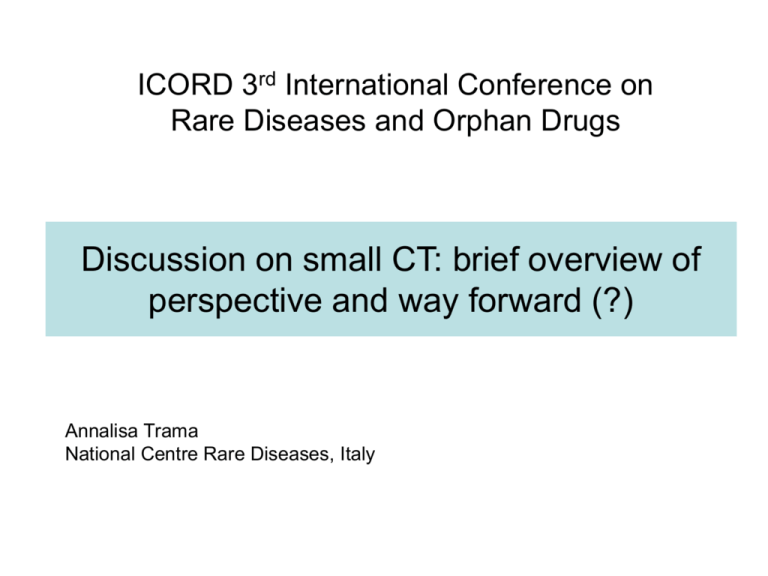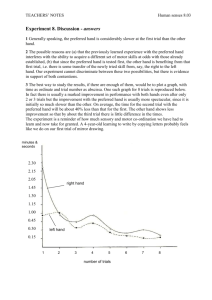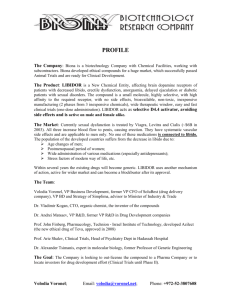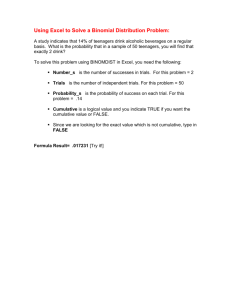Discussion on small CT: brief overview of perspective and
advertisement

ICORD 3rd International Conference on Rare Diseases and Orphan Drugs Discussion on small CT: brief overview of perspective and way forward (?) Annalisa Trama National Centre Rare Diseases, Italy The old issue of sample size • Newell DJ. Type II errors and ethics. BMJ 1978; 41:1789 • Altman DG. Statistics and ethics in medical research III: how large a sample? BMJ 1980; 281:1336-1338 • Freedman B. Scientific value and validity as ethical requirements for research: a proposed explication. IRB Rev Hum Subjects Res 1987; 9:7-10. 1. They are unlikely to produce clear-cut answers 2. They are unable to detect clinically important effects. Such studies might, thus, be scientifically useless, and hence unethical in its use of subjects and resources” 3. Patients in trials might be paying a price for the common future good Different perspectives and arguments Imprecise results are better than no results at all: - meta-analysis may “save” small studies by providing a means to combine the results with those of other similr studies - small studies may not provide a basis for testing hypotheses, they may provide valuable estimates of treatment effects using confidence interval - Bayesian methods can formally model non-trial information and surrogate outcomes into the analysis, enhancing the overall value of an imprecise measurement of main effect - the upsurge of evidence-based medicine and meta-analytical approaches to combining research results has wide implications for what constitutes good science. One such implication is that a low-powered study is not scientifically invalid if it is analysed together with other similar studies, and the combined power of all studies is sufficient. Of course, the contribution which small or large trials might make depends critically on their quality and on the availability Small CT quality • Methodological issues - 2002 EMEA workshop methodological aspects of clinical trials for efficacy evaluation in small population - 2006 Guideline on clinical trials in small populations - 2005 EMEA/CHMP think-tank on innovative drug development - 2007 report of the EMEA/CHMP think-tank group on innovative drug development From the report of the think-tank group on innovative drug development Need for interaction and guidance with regard to innovative statistical approaches and clinical study designs CHMP/Efficacy Working Party guideline on “Flexible Design” (collect experience, workshop, training) Need for development of tailored scientific guidance for quality, non-clinical and reporting requirements for clinical trials with investigational medicinal products. Development of tailored scientific guidance(rare diseases: guideline vs individualised support?) Scientific international fora to validate the use of new methodological/statistical approaches Need to publish results also from negative clinical trials EMEA promotes scientific discussions on novel drug development strategies Availability of the results small trials which do not reach statistical significance might be incorrectly dismissed and not published trial registration it’s not an universal practice yet registration doesn’t guarantee access to patient-level data and doesn’t allow plans to use the data appropriately (prospectively designed meta-analysis) Way forward (?) Rare diseases = small populations trials EMEA EMEA/CHMP think-tank group recommendations European-wide clinical research networks? Trial office to register and co-ordinate all CT? Others…? Bibliographic References • • • • • • • • • Lilford RJ. Clinical trials and rare diseases: a way out of a conundrum. BMJ 1995; 311: 16211625 Edwards SJL et al. Why “underpowered” trials are not necessarily unethical. Lancet 1997; 350: 804-807. Emanuel EJ, Wendler D, Grady C. What Makes Clinical Research Ethical? JAMA 2000; 283 (20): 2701-2711) Halpern SD, Karlawish J, Berlin J. The Continuing unethical conduct of underpowered clinical trials. JAMA 2002; 2008 (3): 358-62. Janosky JE. Hughes JR. Commnets on the Ethics of underpowered Clinical trials. JAMA 2002; 288: 2118-2119. Lagakos SW. Clinical Trials and Rare Diseases. N Engl J Med 2003; 348 (24): 2455-2456. Tan SB et al. Strategy for randomised clinical trials in rare cancers. BMJ 2003;327;47-49 Schulz KF, Grimes DA. Sample size calculations in randomised trials: mandatory and mystical. Lancet 2005; 365: 1348-1353. Behera et al. Evidence based medicine for rare diseases: implications for data interpretation and clinical trial design. Cancer Control 2007; 14 (2): 160-166) EMEA • • • EMEA workshop methodological aspects of clinical trials for efficacy evaluation in small population Guideline on clinical trials in small populations Innovative drug development approaches. Final Report from the EMEA/CHMP-Think-tank group on innovative drug development






